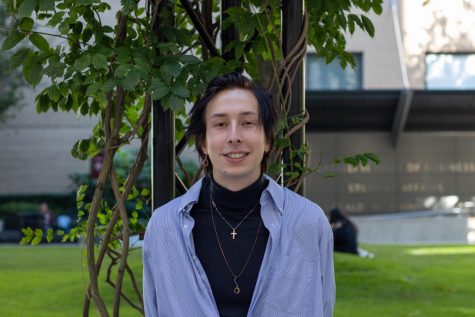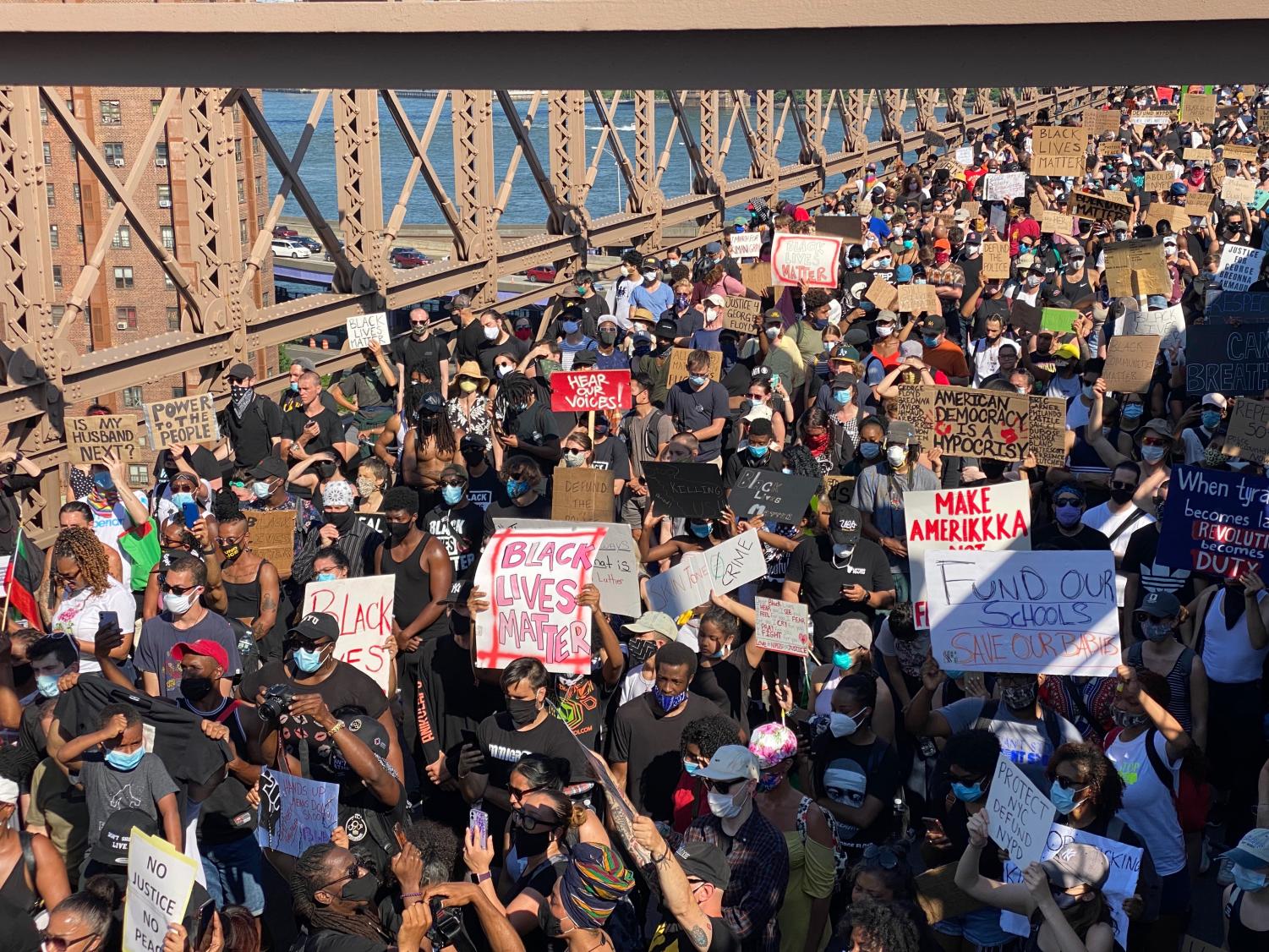
Joe Kottke, FCLC ’23, is a news editor at The Observer. They are majoring in journalism and Spanish studies. In addition to writing and reporting, Joe loves to watch anime, re-read their favorite young adult fiction novels and play piano.


Students express frustration at lack of accountability in election as public support declines
October 28, 2020
When the Minneapolis Police Department murdered George Floyd in late May, students rallied, organized and led the new wave of the Black Lives Matter (BLM) movement into the summer with the central demand of defunding police departments and investing in Black communities.
Now, with the arrival of the presidential election, neither candidate has pledged to fulfill the demands. President Donald Trump has asserted himself as the “law-and-order candidate,” while democratic nominee Joe Biden has taken a stance of police reform, but in doing so, also declared the need to increase police funding to aid in the reform process.
“When we look to the heart of where this summer uprising began, Minneapolis, the city council there has still taken no significant efforts to actually defund their police, much less abolish them,” Woody Wisz, Fordham College at Lincoln Center (FCLC) ’23, said. “Joe Biden, regardless of his past, has committed to giving more funding to police. If they get more money, they’re gonna hire more officers.”
In an anonymous political survey of 211 Fordham students conducted by The Observer, respondents were asked to rank what they think are the most pressing issues in the U.S. Policing earned the third highest ranking with 50.7%, slightly trailing behind climate change at 79.1% and health care at 64%.
“I think the Black Lives Matter movement will remain a primary issue in the minds of most Americans.” Amara McNeil, FCLC ’23
Raekwon Fuller, FCLC ’23, emphasized that finding solutions to the survey’s top contenders for most pressing issues “is how policing will ultimately change,” due to the interconnectedness of the racist roots of American policing, environmental racism and anti-blackness in the medical field.
In a follow-up question on how confident respondents are that the most pressing issues will be addressed in the next four years, only 19.4% of students said they are confident.
“I think the Black Lives Matter movement will remain a primary issue in the minds of most Americans,” Amara McNeil, FCLC ’23, said. “But I don’t see us making any significant strides forward when it comes to actually changing policy and bettering the lives of people until we recognize that the systems of power are the issue and not the people who are in power.”
According to The Observer’s 2020 Political Survey, 84.4% of students participated in the BLM movement this summer either in person, online or a combination of the two. In contrast, only 55.9% of students were active in the movement prior to the murder of George Floyd.
In June, Fuller led protests in his home state of South Carolina. “Something just ignited in me. I think the greatest change for me was getting into a society of African American people who understand the value of their skin, and them teaching me to stand up for myself and to love myself.”
“You see some people who are still trying to keep the fight alive, and are going to protests, but it’s not as prevalent as it used to be.” Raekwon Fuller, FCLC ’23
Pantho Sayed, Fordham College at Rose Hill ’22, did not participate in any BLM protests this summer. He said he is against police abolition but believes in the need for reform — a view he considered to be “not nearly as radical” as those of his college peers.
“The system needs a way to ensure people who don’t deserve to be cops don’t get a badge, and that those who do wrong things as a law enforcement officer are held accountable like everyone else,” he said.
Ahmari Alford, FCLC ’21, spent the summer getting involved virtually in the BLM movement since she is immunocompromised. Before the pandemic, she spent many years organizing in her community in person. She advocates for abolition as the best route for the future of policing instead of defunding or reform.
“The ultimate goal of abolishing the police is to reshift their jobs to properly trained officials who would not jump to violence in the event that they’re put in danger,” Alford said. “You’re implementing real resources and spaces for communities to be kept safe that aren’t just reactionary.”
Abolition is an idea at the forefront of movements against police brutality internationally. Members of the #EndSARS, a Nigerian movement against the Special Anti-Robbery Squad (SARS), claim abolition as a form of necessary decolonization.
Even with international solidarity, only 15% of U.S. citizens support police abolition, according to one study conducted by Gallup.
Overall support for BLM has dropped too. By August, when the Kenosha Police Department’s shooting of Jacob Blake went viral, the same study found only 55% of U.S. adults supported BLM — a decrease from the 67% reported in June.
“It died down,” Fuller said. “You see some people who are still trying to keep the fight alive, and are going to protests, but it’s not as prevalent as it used to be.”
“A lot of people I was around seemed to suddenly care about the things that I had been caring about for a really long time. But I think I got a little too excited too fast,” McNeil said. “People are already starting to not care anymore. It’s not the hottest topic, it’s not the trendy thing to do anymore.”
According to The Observer’s Survey, 40.3% of students’ image of their preferred candidate for the presidential election changed in the last six months due to their response to the pandemic and the BLM movement.
“Having a candidate who would benefit the Black Lives Matter movement has always been a priority, however in light of our options, the standards are low, and I’d simply prefer one who doesn’t consistently condemn the movement,” one anonymous respondent said.
“Liberation cannot happen under the current state of the government.” Anonymous survey respondent
An almost-unanimous 94.3% of students said they believe that the BLM movement has influenced people’s thoughts on the 2020 election, while a lesser 79.6% of respondents said they believe the BLM movement has influenced politics and will trigger legislative change.
“The movement has an emphasis on community and working from the bottom up, but clearly the government officials care more about their pockets than the general happiness of the country. Liberation cannot happen under the current state of the government,” another respondent wrote.
Due to continued demonstrations, New York — as well as Portland and Seattle — was labeled an anarchist jurisdiction by the Justice Department in September. The designation threatened loss of federal funding to the city, but it has not led to a decrease in police presence in disrupting protesters.
Students with different views on voting and the U.S. government agreed that protesters would be safer under a Biden administration.
“I do think that we’re going to continue to see the exact same situation we’re in right now, no matter who gets elected,” Alford said.
“I truly don’t believe in the whole ‘elect him (Biden) in and we’ll just hold his feet to the fire’ rhetoric because the minute you criticize Biden right now, you have people attacking you and saying that you’re a Trump supporter. So, no you actually don’t plan on holding people’s feet to the fire. You want to let him in and then go back to doing whatever you were doing before.”
Within the Fordham community, a significantly larger number of students plan on voting than those who said they value activism.
In comparison with the almost-unanimous 93.4% of students who said they planned on voting, only 77.7% partake in online activism, and an even smaller percentage, 52.6%, engage in in-person activism — including protesting, canvassing and other initiatives.
“If people who actually voted were on the ground supporting their community, they would realize that their vote is nowhere near as meaningful as attending an organized demonstration or helping crowdfund for bail funds,” Alford said.
McNeil said that although she believes that organizing under Biden would be easier, nothing will change in the long term unless this political system is dismantled.

Joe Kottke, FCLC ’23, is a news editor at The Observer. They are majoring in journalism and Spanish studies. In addition to writing and reporting, Joe loves to watch anime, re-read their favorite young adult fiction novels and play piano.